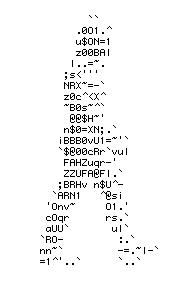Blogger und Journalisten - Blogosphere Crackpots und Culture Clashes?
Jeff Jarvis von Buzzmachine hatte allen Grund sich über Journalisten zu ärgern. Aber der Reihe nach:
Von Nieman Reports erhielt er die Anfrage, einen Artikel über Weblogs zu schreiben. Gesagt getan. Hier der Text.
Nachdem er den Text zum "Gegenlesen" eingesandt hatte erhielt er ihn mit folgenden "Korrekturen" zurück (nur ein Ausschnitt):
: I said that weblogs have the "potential to unlock a treasure of audience content."
: She said, "a treasure of audience interactivity."
: And that's essentially insulting to weblogs; it devalues them. This isn't just another way to chat, damnit. This is content as much as any newspaper's or magazine's content.
: I said: "Weblogs are conversation."
: She said, "Weblogs are a tool for creating conversation."
: There's a difference. Again, this isn't just another community tool. It's a content tool. Besides, her sentence was wordier. First rule of editing: Take words out, don't add them in.
: I said: "Weblogs can also change the world."
: She said: "Weblogs ... can also expand the way we think about and experience events around the world."
: Well, that's poorly stated and wimpy and wordy and it's not what I said. I meant what I said. This isn't about viewing the world. It's about changing the world. Again, the apparent aim is to defang weblogs.
: I said: "Weblogs are revolutionary."
: She said: "In Iran and other nations where people are repressed, we are learning that Weblogs can be tools of revolution."
: Once again, wordy and obtuse and diluted. Weblogs are revolutionary much closer to home -- in America ... and in newsrooms.
I said, "Now I don’t intend to engage in a debate about whether webloggers will replace reporters; that’s at least as tedious as a J-school seminar on objectivity."
: She took out the J-school line.
: Thus my joke turned into a haughty declaration and I turned into an asshole. Second rule of editing: Never make your writers look like assholes -- unless you pay handsomely for the privilege. And, by the way, we wouldn't want to joke about J-school, would we?
Das war ihm genug und er beschloss, den Artikel zurückzuziehen. Mit folgenden Begründungen:
So when I got the "edit" back, I responded by simply asking to kill the piece. I would have left it at that: time wasted. But then I got this most irksome email: "I knew that when we set out to do this project there might be a culture clash between the more staid journalism world (which I guess we tend to represent) and blogosphere, and I think you and I might have stumbled into that clash."
Whoa right there! I am a journalism executive, a writer and an editor, J-school trained, even; check the about me. My DNA is filled with pulp paper and slick ink and TV dots; I'm a damned journalism gray-beard (albeit prematurely gray, of course). I have unique experience living in both worlds, old and new. Yet here she was treating me like some blogosphere crackpot. Culture clash? I was insulted at the notion.
But maybe there is a culture clash, more than I knew or would admit. Journalism still needs to escape its closed, think-tank think and get out there and use the tools the audience is using. They need to read what the audience is writing. They need to listen. That's what is so damned exciting about weblogs. Weblogs give you the chance to hear your audience and what they really care about -- if only you are ready to listen.
Recht hat er,...und irgendwie kommt mir das alles so "verd..." bekannt vor. .. ...und um es mit einigen Zeilen von Randy Newman auszudrücken:
They would not listen; they did not know how--
Perhaps they'll listen now....
oder eher:
They would not listen; they're not listening still--
Perhaps they never will.....
Hier geht's zum vollständigen Eintrag: A world without editors
Von Nieman Reports erhielt er die Anfrage, einen Artikel über Weblogs zu schreiben. Gesagt getan. Hier der Text.
Nachdem er den Text zum "Gegenlesen" eingesandt hatte erhielt er ihn mit folgenden "Korrekturen" zurück (nur ein Ausschnitt):
: I said that weblogs have the "potential to unlock a treasure of audience content."
: She said, "a treasure of audience interactivity."
: And that's essentially insulting to weblogs; it devalues them. This isn't just another way to chat, damnit. This is content as much as any newspaper's or magazine's content.
: I said: "Weblogs are conversation."
: She said, "Weblogs are a tool for creating conversation."
: There's a difference. Again, this isn't just another community tool. It's a content tool. Besides, her sentence was wordier. First rule of editing: Take words out, don't add them in.
: I said: "Weblogs can also change the world."
: She said: "Weblogs ... can also expand the way we think about and experience events around the world."
: Well, that's poorly stated and wimpy and wordy and it's not what I said. I meant what I said. This isn't about viewing the world. It's about changing the world. Again, the apparent aim is to defang weblogs.
: I said: "Weblogs are revolutionary."
: She said: "In Iran and other nations where people are repressed, we are learning that Weblogs can be tools of revolution."
: Once again, wordy and obtuse and diluted. Weblogs are revolutionary much closer to home -- in America ... and in newsrooms.
I said, "Now I don’t intend to engage in a debate about whether webloggers will replace reporters; that’s at least as tedious as a J-school seminar on objectivity."
: She took out the J-school line.
: Thus my joke turned into a haughty declaration and I turned into an asshole. Second rule of editing: Never make your writers look like assholes -- unless you pay handsomely for the privilege. And, by the way, we wouldn't want to joke about J-school, would we?
Das war ihm genug und er beschloss, den Artikel zurückzuziehen. Mit folgenden Begründungen:
So when I got the "edit" back, I responded by simply asking to kill the piece. I would have left it at that: time wasted. But then I got this most irksome email: "I knew that when we set out to do this project there might be a culture clash between the more staid journalism world (which I guess we tend to represent) and blogosphere, and I think you and I might have stumbled into that clash."
Whoa right there! I am a journalism executive, a writer and an editor, J-school trained, even; check the about me. My DNA is filled with pulp paper and slick ink and TV dots; I'm a damned journalism gray-beard (albeit prematurely gray, of course). I have unique experience living in both worlds, old and new. Yet here she was treating me like some blogosphere crackpot. Culture clash? I was insulted at the notion.
But maybe there is a culture clash, more than I knew or would admit. Journalism still needs to escape its closed, think-tank think and get out there and use the tools the audience is using. They need to read what the audience is writing. They need to listen. That's what is so damned exciting about weblogs. Weblogs give you the chance to hear your audience and what they really care about -- if only you are ready to listen.
Recht hat er,...und irgendwie kommt mir das alles so "verd..." bekannt vor. .. ...und um es mit einigen Zeilen von Randy Newman auszudrücken:
They would not listen; they did not know how--
Perhaps they'll listen now....
oder eher:
They would not listen; they're not listening still--
Perhaps they never will.....
Hier geht's zum vollständigen Eintrag: A world without editors
Cyberwriter - 23. Jul, 18:25 - Blogging
3 Kommentare - Kommentar verfassen - 0 Trackbacks
Dr.Manhattan - 24. Jul, 14:40
the clash and the revolution
spannende sache - aber was ich schon sagen muss, der anspruch, die utopie "Weblogs can also change the world." ist natürlich einfach etwas zu hoch gegriffen, und erinnert an die web-evangelisten der frühen bis mitte-neunziger jahre samt nachfolgendem megahype - wo die erlösung der menschheit nach der überwindung des kaltenkriegs durch die allumfassende kommunikation und grenzenlosen wissensdatenverkehr über highways rollen sollte (phantasierte einbahnverteilungssysteme vor p2p) einerseits, andererseits eben die umfassende gleichberechtigung aller stattfände - und es nur mehr drum ginge, alle welt mit modems zu versorgen.
man muss also präziser formulieren, welche welt verändert wird/werden kann. denk mir auch, dass die medienwelt verändert wird, denk aber mehr an ein ergänzen.
momentan denk ich grad an http://news.google.com - und ob das das letzte gefecht der "klassischen" medien (auch wenn es die online-ableger der printmedien sind) ist - und wo da ähnliches auf weblogebene passiert, mit ähnlichem hoheitsanspruch auf weltdeutung.
(noch a bissi unfertig der gedanke)
man muss also präziser formulieren, welche welt verändert wird/werden kann. denk mir auch, dass die medienwelt verändert wird, denk aber mehr an ein ergänzen.
momentan denk ich grad an http://news.google.com - und ob das das letzte gefecht der "klassischen" medien (auch wenn es die online-ableger der printmedien sind) ist - und wo da ähnliches auf weblogebene passiert, mit ähnlichem hoheitsanspruch auf weltdeutung.
(noch a bissi unfertig der gedanke)
Cyberwriter - 24. Jul, 22:50
Das mit...
...Change "the World",...ich weiss was Du meinst. Vielleicht ging es eher um die "gute Sache". Ich meine damit das was Rebecca Blood in ihrem BlogTalk Papier: Waging Peace: Using our Powers for Good umschreibt. (o.k. der titel ist vielleicht etwas pathetisch *grins*)
Was "google" angeht,...da bin ich mir auch noch nicht ganz sicher, was ich davon halten soll. Besonders albern führen sich diesbezüglich allerding wieder die Journalisten auf,....die befürchten bald überflüssig zu werden. Wer schreibt denn die Medungen die Google in ihrem Dienst anbietet? .... der heilige Geist?? *grins*
Was "google" angeht,...da bin ich mir auch noch nicht ganz sicher, was ich davon halten soll. Besonders albern führen sich diesbezüglich allerding wieder die Journalisten auf,....die befürchten bald überflüssig zu werden. Wer schreibt denn die Medungen die Google in ihrem Dienst anbietet? .... der heilige Geist?? *grins*
Dr.Manhattan - 25. Jul, 17:52
die gute sache
kann ich nachvollziehen, das seh ich auch so.
es ist natürlich ein gefühl von "power" wenn man ein mächtiges redaktionstool hat, und mit wenig aufwand die ganze vernetzte welt erreichen kann (theoretisch mal zumindest; wir wollen mal nicht hoffen, dass alle auf einen zugreifen, der traffic würde dich arm machen).
von da kommt auch diese abwehrhaltung von einem teil der journalisten; vieles vom selbstverständnis des journalismus speist sich aus der verfügbarkeit überlegener quellen (wissensvorsprung; agenturen) einerseits und überlegener distribution andererseits.
beides scheint bedroht; böse ist natürlich auch die vergleichbarkeit, die z.b. durch google möglich wird. wer hat früher schon mehrere zeitungen gleichzeitig lesen können? heute macht das news.google (oder auch der cyberwriter, s. iran-blogs ;)
es ist natürlich ein gefühl von "power" wenn man ein mächtiges redaktionstool hat, und mit wenig aufwand die ganze vernetzte welt erreichen kann (theoretisch mal zumindest; wir wollen mal nicht hoffen, dass alle auf einen zugreifen, der traffic würde dich arm machen).
von da kommt auch diese abwehrhaltung von einem teil der journalisten; vieles vom selbstverständnis des journalismus speist sich aus der verfügbarkeit überlegener quellen (wissensvorsprung; agenturen) einerseits und überlegener distribution andererseits.
beides scheint bedroht; böse ist natürlich auch die vergleichbarkeit, die z.b. durch google möglich wird. wer hat früher schon mehrere zeitungen gleichzeitig lesen können? heute macht das news.google (oder auch der cyberwriter, s. iran-blogs ;)





















Trackback URL:
https://cyberwriter.twoday.net/STORIES/48043/modTrackback